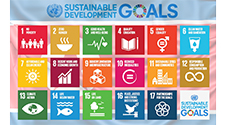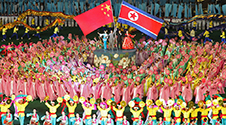Becoming a Member of International Society in the SDG Era?
The advent of the sustainable development goals (SDGs) era, endorsed by the 70th UN General Assembly in September 2015, requires all UN member states to abide by the global norm of the SDGs until 2030 by placing a stronger emphasis on cultivating inclusive state-society relations oriented towards promoting economic growth and social development within planetary boundaries and human rights protection. Replacing the Millennium Development Goals (MDGs) of 2000, the SDGs, composed of 17 goals and 169 targets, have become the highest end of shared norms and universal goals of international society under the slogan of “no one should be left behind.” While all UN members are asked to report their own “voluntary national review (VNR)” explaining how they are implementing the SDGs at the national level to the UN High-Level Political Forum (HLPF) every four years, a few countries such as the United States and North Korea have not yet submitted their VNRs. However, it is interesting to see that North Korea has officially promised to report its VNR to the HLPF by July 2020, a deadline which has now been delayed due to COVID-19. Why did North Korea decide to comply with the global assignment of VNR reporting? Can it be said that North Korea wants to become a real member of international society in the SDG era by declaring its willingness to participate?
North Korea’s Proactive Engagement in the SDGs
Indeed, North Korea has been proactive in its effort to join the ranks of UN member countries which satisfy the basic requirement of SDG preparation and implementation since it participated in the regional SDG conference initiated by UNESCAP in 2017. The North Korean delegation strongly emphasized its readiness to fulfill the mission of the SDGs at the national level in line with its 5-Year National Strategy for Economic Development (NSED), particularly in the areas of zero hunger (Goal 2), clean water and sanitation (Goal 6), affordable and clean energy (Goal 7), sustainable cities and communities (Goal 11), responsible consumption and production (Goal 12), life on land (Goal 15), and partnership for the goals (Goal 17). In October 2019 when UNESCAP hosted another regional SDG conference in Vladivostok, North Korea presented a very detailed and well-organized plan to achieve the SDGs and manage the implementation mechanism via a “whole-of-society” approach for all 17 Goals. Its proactive engagement with the SDGs is flabbergasting in terms of the high quality of the content and of its institutional support, both of which the Workers’ Party of Korea, which has not been a good follower of global norms and rules, will orchestrate. Its preparation schemes, seemingly, are absolutely better than those of South Korea and other advanced economies and even seem to be desperate to achieve the SDGs to ensure the survival and elevated standard of living for the North Korean people.
Why is North Korea Engaging in the Implementation of the SDGs?
The reasons why North Korea is involving itself in implementing a global norm like the SDGs can be understood largely through the following four interpretations. First, the SDGs are a soft norm without binding enforcement. A verbal pledge to achieve the SDGs is not necessarily followed by real implementation, simply because there is no centralized authority to punish violators at the global level. North Korea, therefore, will not lag behind if it simply makes an official promise to international society. Second, North Korea can become a good citizen of international society by sending a strong signal of its intention to conform to the global rules shared by all UN member states. This relates to the third observation that North Korea has made a strategic calculation to get more aid and economic support from the international community in signaling its strong willingness to follow the SDGs. North Korea is rather fraught with despair under the current economic sanctions and needs an exit strategy from the protracted deadlock. The logical upshot is that the SDGs would provide a great opportunity space for North Korea. Finally and most importantly, the SDGs per se would be a very tempting and handy instrument for North Korea to maximize the universal and global values for its domestic agenda of national development strategies. By aligning the global norm of the SDGs with the 5-Year NSED, Pyongyang can not only justify the national development plan as being linked with the global trend, but also persuade the people to tighten their belts further for economic development despite the severe economic sanctions imposed by the US-led alliance. In fact, we can confirm this via the Party newspaper, the Rodong Sinmun, which has often used the term “sustainable development” since 2015.
Utilizing the Global Norms for the Sake of the National Strategy for Development
In many cases, the universality of global norms can be strategically utilized for the specific purpose of individual states. The global norms are reborn and reformulated by domestic political regimes for their survival and other strategic interests. China has been equalizing its national implementation of the SDGs with the grand strategy of the Belt and Road Initiative (BRI). The UK has determined that British foreign aid is the best package to align the implementation of the SDGs with the realization of its national interests by tackling global poverty and inequality. Likewise, North Korea has also made a smart move to utilize global norms for the sake of its national strategy for economic development, together with the strategic purposes of its external relations with the international community. In a nutshell, North Korea’s preparation for the SDGs should be decoded at the nexus of its national strategies and its exposure to global norms and rules as a member of international society.■
■ Taekyoon Kim currently serves as an executive director of the Korea International Cooperation Agency and a member of the Sustainable Development Committee for the city of Seoul. He also served as a visiting professor at the Woodrow Wilson International Center for Scholars, USA, Lingnan University, Hong Kong and Tübingen University, Germany. His recent publications include "Tax Reform, Tax Compliance and State-Building in Tanzania and Uganda," Africa Development 43(2), 2018 (co-authored), and "Social Politics of Welfare Reform in Korea and Japan: A New Way of Mobilizing Power Resources," Voluntas 30(2), 2019 (co-authored). He received his Ph.D. in international relations from Johns Hopkins University-SAIS and D.Phil. in social policy and intervention from the University of Oxford.





